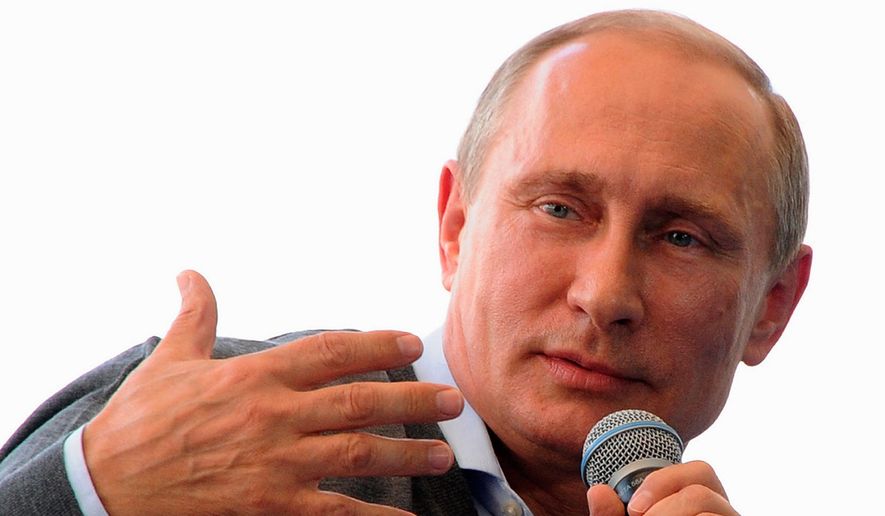The muted American response to Russia’s invasions of Ukraine could have consequences far beyond Eastern Europe, according to security analysts who fear the crisis may discourage countries in the future from swearing off nuclear weapons like Kiev did in a 1994 treaty.
Three years after the Soviet Union’s breakup, newly independent Ukraine was compelled by the three nuclear superpowers to enter into the Budapest Memorandum on Security Assurances, a treaty that guaranteed its signatories would respect the “territorial integrity or political independence of Ukraine” and “seek immediate U.N. Security Council action” if the country should face an “act of aggression in which nuclear weapons are used.”
Although the agreement only requires the signatories take immediate action if Ukraine is threatened with nuclear weapons, foreign policy and Russian experts say U.S. inaction risks signaling to countries like Iran, Pakistan and North Korea that their sovereignty could be at risk without a nuclear arsenal.
“Arms reduction should be a policy in consideration for all nations that have them. But I don’t think that’s the reason that Ukraine is experiencing the problems it is having,” said Brad Blakeman, a former adviser to President George W. Bush and former president of the national security group Freedom’s Watch. “The reason is a weak America and a Cold War relationship with Putin where there is neither respect nor fear of the United States.
“The U.S. has no credibility. Why would anyone enter into an agreement with us now?” he asked.
Stephen Blank, a senior fellow at the American Foreign Policy Council who specializes in Russian affairs and international security, agreed.
SEE ALSO: Obama foreign policy diminishes U.S. standing in fight against terrorism: Mike Rogers
“To countries like Iran and North Korea, this is one more example that giving up their nuclear weapons makes no sense, because no guarantee will stand,” he said.
Prior to the 1994 accord, Ukraine harbored the third-largest nuclear arsenal in the world. In April Ukrainian parliament member Pavlo Rizanenko told USA Today that many of his colleagues were already discussing the possibility of rearmament.
“We gave up nuclear weapons because of this agreement,” he said. “Now there’s a strong sentiment in Ukraine that we made a big mistake.”
Then-acting Ukraine President Oleksandr Turchynov also wrote an op-ed for The New York Times warning that the apparent consequences of Ukraine’s disarmament “may lead to nuclear proliferation around the world.”
Ariel Cohen, director of the Center for Energy Natural Resources and Geopolitics at the Institute for the Analysis of Global Security, said the situation “looks like a disaster for Ukraine, but more importantly, it looks like a disaster for the cause of nonproliferation.
“This is because the three principal nuclear powers guaranteed Ukraine’s territorial sovereignty in exchange for its abandoning its nuclear weapons, and now the Russians are paying a relatively low price for violating the Budapest protocol.”
SEE ALSO: Putin: ‘I want to remind you that Russia is one of the leading nuclear powers’
Mr. Cohen, who spoke to The Washington Times via telephone from Kiev, added, “This sends a strong signal to proliferators such as North Korea, Pakistan, Iran and others that any kind of security guarantees from the existing nuclear club are not worth the paper they are written on. Events in Ukraine have turned a nonproliferation regime on its head.”
The Budapest Memorandum also promised that its signatories would not place undue economic pressure on Ukraine so that it would not be compelled to surrender its power in exchange for financial aid; the current Moscow-Kiev conflict erupted in March after the Ukrainian Parliament ousted former President Viktor Yanukovych for accepting a $15 billion bailout from the Kremlin.
When the crisis began, the State Department issued a press release in March noting that President Obama had called then-acting Ukraine President Oleksandr Turchynov “to assure him of the strong support of the United States,” and also called Mr. Putin to tell him that Moscow was violating the 1994 treaty.
Nearly three weeks later, Russia annexed Crimea, and the Kremlin has also struck back with a public relations campaign aimed at the White House. New Russian military incursions into eastern Ukraine were also reported over the last week, raising talk that Moscow might try to create a Russian state in the region.
The Russian Foreign Ministry has accused the U.S. and EU of “active connivance” in what it referred to as “the coup d’etat in Kiev, acting against the political independence and sovereignty of Ukraine in violation of their obligations under the Budapest Memorandum.”
Last Monday at the University of Virginia in Charlottesville, Russian Ambassador Sergey Kislyak defended the Kremlin to a small group of political science students, arguing that the conflict is between Ukraine and its own people, not Russia and Ukraine.
“The biggest problem in Ukraine is that the government in Kiev, instead of talking to their own people, started bombing. And by bombing, they create more and more opposition to Kiev,” he said.
David Satter, a renowned Russian scholar who lived in the USSR from 1976-1982 and was expelled from Moscow last year by Mr. Putin’s government, says the Kremlin is resorting to Soviet-style propaganda.
“What they’re saying [is] not convincing to a world audience,” Mr. Satter said. “It’s not convincing people who have access to objective information, but it is convincing to a population that is relying for its information on state-controlled television, which is in the grip of chauvinistic euphoria right now. They can say anything they want to that kind of audience. The more threatened Putin feels he is, the more he will be tempted to resort to war to distract the Russian public from the truth. People who are swept in the war hysteria may believe a lot of it.”
• Jeffrey Scott Shapiro can be reached at jshapiro@washingtontimes.com.




Please read our comment policy before commenting.